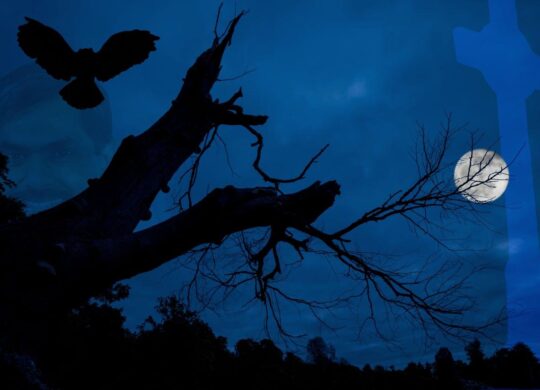Woods!

The woods. Bliss. Birds chirping, streams gurgling, and leaves rustling. Even replicated on white-noise machines to bring rest to rushing minds. All is calm. All is bright.
But not at night. ‘Cos it ain’t no “Silent Night.” Woods are “lovely,” yes, but they are “dark and deep” as quoth ye olde poet.
And confessed Eric Larsen, a polar explorer, outdoor educator, and self-described “professional camper” who has spent years of his life sleeping outside and also been charged by moose and interrupted by polar bears:
There have been times when I’ve been on my own camping overnight and at that dusk time, when things start to get a little quiet, I’ve started to get a little nervous.”
Suzie Dundas in Atlas Obscura argues that if mere nocturnal noise still makes a seasoned outdoorsman uneasy, there has to be a biological reason why sounds that are pleasant during the day can make one’s heart skip a beat at night.
According to psychologist Sésha Zinn, who researches human trauma, it’s more than just a fear of the unknown. Rather, it’s your brain working differently after dark.
Our vision takes up a lot of brain activity, so when it is inhibited, our brain can give more of its resources to our other senses. And when that happens, brains release stress hormones, intended to keep us safe. But that also means interpreting innocuous sounds as possible threats. Any sounds under these conditions will be interpreted as potentially dangerous, whereas in the daylight, we would not recognize many of these sounds as a concern.”
After all many predators hunt at night. So it’s all an artifactual leftover from our ancient past.
Larsen, the camper:
Practically, a lot of animals are more nocturnal, so just from a biological standpoint, fear can help you. It lets you know there’s a greater potential for danger.”
Our hypervigilant reaction to being in the woods at night is so ancient that even a professional camper like Larsen can’t escape it.
Zinn explains:
No matter how long anyone spends in the outdoors, their startle response will always activate and be on high alert. It’s a matter of survival, our most basic human instinct.”
(And if your phone doesn’t show a few bars of connectivity, that adds another layer of stress—a distinctly 21st-century wrinkle to feeling so unsettled.)
So if you do find yourself jolted awake more in the woods often than you’d like, just remember that it’s your brain working normally, and something everyone experiences to some degree. “
But there is a better way to overcome the terrors of the dark.
The one who dwells in the shelter of the Most High,
in the shadow of the Almighty he will remain.
I will say to Yahweh, “My refuge and my steadfastness,
My God, I trust in Him.”
For He it is who rescues you from the fowler’s trap
[and] from the ruinous plague.
With His pinion He gives cover to you,
and under His wings you can seek refuge;
a shield and a bulwark is His faithfulness.
You will not be in fear from the terror of night,
from the arrow that flies by day,
from the plague that stalks in darkness,
from the destruction that devastates at noontimes.
They may fall at your side, a thousand,
and ten thousand at your right hand;
to you it will not approach.
You will, with your eyes, only gaze,
and the requital of the wicked you will see,
for you—you have set Yahweh, my refuge,
the Most High, as your dwelling place.
Psalm 91:1–9
SOURCE: Atlas Obscura











 Abe Kuruvilla is the Carl E. Bates Professor of Christian Preaching at The Southern Baptist Theological Seminary (Louisville, KY), and a dermatologist in private practice. His passion is to explore, explain, and exemplify preaching.
Abe Kuruvilla is the Carl E. Bates Professor of Christian Preaching at The Southern Baptist Theological Seminary (Louisville, KY), and a dermatologist in private practice. His passion is to explore, explain, and exemplify preaching.